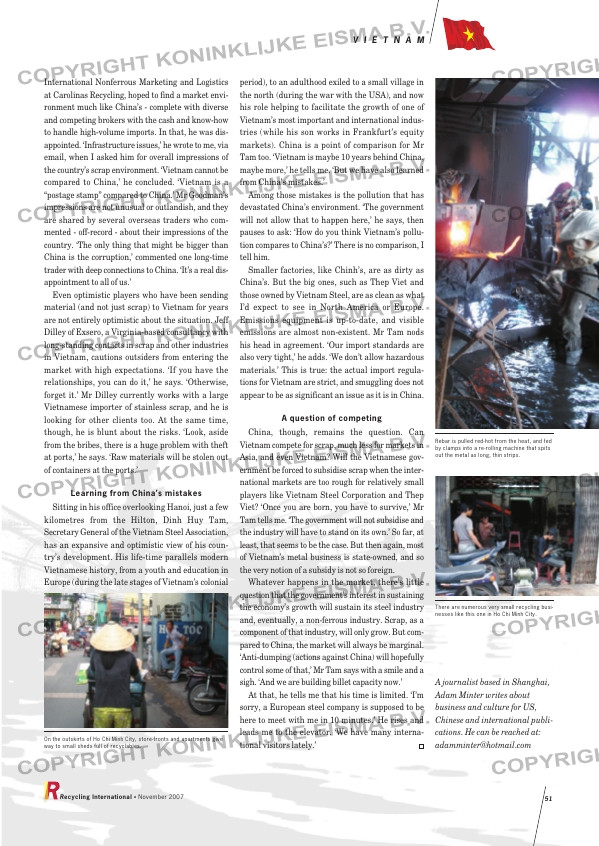Page 51 from: November 2007

International Nonferrous Marketing and Logistics
at Carolinas Recycling, hoped to find a market envi-
ronment much like China’s – complete with diverse
and competing brokers with the cash and know-how
to handle high-volume imports. In that, he was dis-
appointed. ‘Infrastructure issues,’ he wrote to me, via
email, when I asked him for overall impressions of
the country’s scrap environment. ‘Vietnam cannot be
compared to China,’ he concluded. ‘Vietnam is a
“postage stamp” compared to China.’ Mr Goodman’s
impressions are not unusual or outlandish, and they
are shared by several overseas traders who com-
mented – off-record – about their impressions of the
country. ‘The only thing that might be bigger than
China is the corruption,’ commented one long-time
trader with deep connections to China. ‘It’s a real dis-
appointment to all of us.’
Even optimistic players who have been sending
material (and not just scrap) to Vietnam for years
are not entirely optimistic about the situation. Jeff
Dilley of Exsero, a Virginia-based consultancy with
long-standing contacts in scrap and other industries
in Vietnam, cautions outsiders from entering the
market with high expectations. ‘If you have the
relationships, you can do it,’ he says. ‘Otherwise,
forget it.’ Mr Dilley currently works with a large
Vietnamese importer of stainless scrap, and he is
looking for other clients too. At the same time,
though, he is blunt about the risks. ‘Look, aside
from the bribes, there is a huge problem with theft
at ports,’ he says. ‘Raw materials will be stolen out
of containers at the ports.’
Learning from China’s mistakes
Sitting in his office overlooking Hanoi, just a few
kilometres from the Hilton, Dinh Huy Tam,
Secretary General of the Vietnam Steel Association,
has an expansive and optimistic view of his coun-
try’s development. His life-time parallels modern
Vietnamese history, from a youth and education in
Europe (during the late stages of Vietnam’s colonial
period), to an adulthood exiled to a small village in
the north (during the war with the USA), and now
his role helping to facilitate the growth of one of
Vietnam’s most important and international indus-
tries (while his son works in Frankfurt’s equity
markets). China is a point of comparison for Mr
Tam too. ‘Vietnam is maybe 10 years behind China,
maybe more,’ he tells me. ‘But we have also learned
from China’s mistakes.’
Among those mistakes is the pollution that has
devastated China’s environment. ‘The government
will not allow that to happen here,’ he says, then
pauses to ask: ‘How do you think Vietnam’s pollu-
tion compares to China’s?’ There is no comparison, I
tell him.
Smaller factories, like Chinh’s, are as dirty as
China’s. But the big ones, such as Thep Viet and
those owned by Vietnam Steel, are as clean as what
I’d expect to see in North America or Europe.
Emissions equipment is up-to-date, and visible
emissions are almost non-existent. Mr Tam nods
his head in agreement. ‘Our import standards are
also very tight,’ he adds. ‘We don’t allow hazardous
materials.’ This is true: the actual import regula-
tions for Vietnam are strict, and smuggling does not
appear to be as significant an issue as it is in China.
A question of competing
China, though, remains the question. Can
Vietnam compete for scrap, much less for markets in
Asia, and even Vietnam? Will the Vietnamese gov-
ernment be forced to subsidise scrap when the inter-
national markets are too rough for relatively small
players like Vietnam Steel Corporation and Thep
Viet? ‘Once you are born, you have to survive,’ Mr
Tam tells me. ‘The government will not subsidise and
the industry will have to stand on its own.’ So far, at
least, that seems to be the case. But then again, most
of Vietnam’s metal business is state-owned, and so
the very notion of a subsidy is not so foreign.
Whatever happens in the market, there’s little
question that the government’s interest in sustaining
the economy’s growth will sustain its steel industry
and, eventually, a non-ferrous industry. Scrap, as a
component of that industry, will only grow. But com-
pared to China, the market will always be marginal.
‘Anti-dumping (actions against China) will hopefully
control some of that,’ Mr Tam says with a smile and a
sigh. ‘And we are building billet capacity now.’
At that, he tells me that his time is limited. ‘I’m
sorry, a European steel company is supposed to be
here to meet with me in 10 minutes.’ He rises and
leads me to the elevator. ‘We have many interna-
tional visitors lately.’
V I E T N A M
Recycling International • November 2007 51
A journalist based in Shanghai,
Adam Minter writes about
business and culture for US,
Chinese and international publi-
cations. He can be reached at:
[email protected]
There are numerous very small recycling busi-
nesses like this one in Ho Chi Minh City.
Rebar is pulled red-hot from the heat, and fed
by clamps into a re-rolling machine that spits
out the metal as long, thin strips.
On the outskirts of Ho Chi Minh City, store-fronts and apartments give
way to small sheds full of recyclables.
RI_008 Vietnam:Opmaak 1 08-11-2007 09:48 Pagina 51



